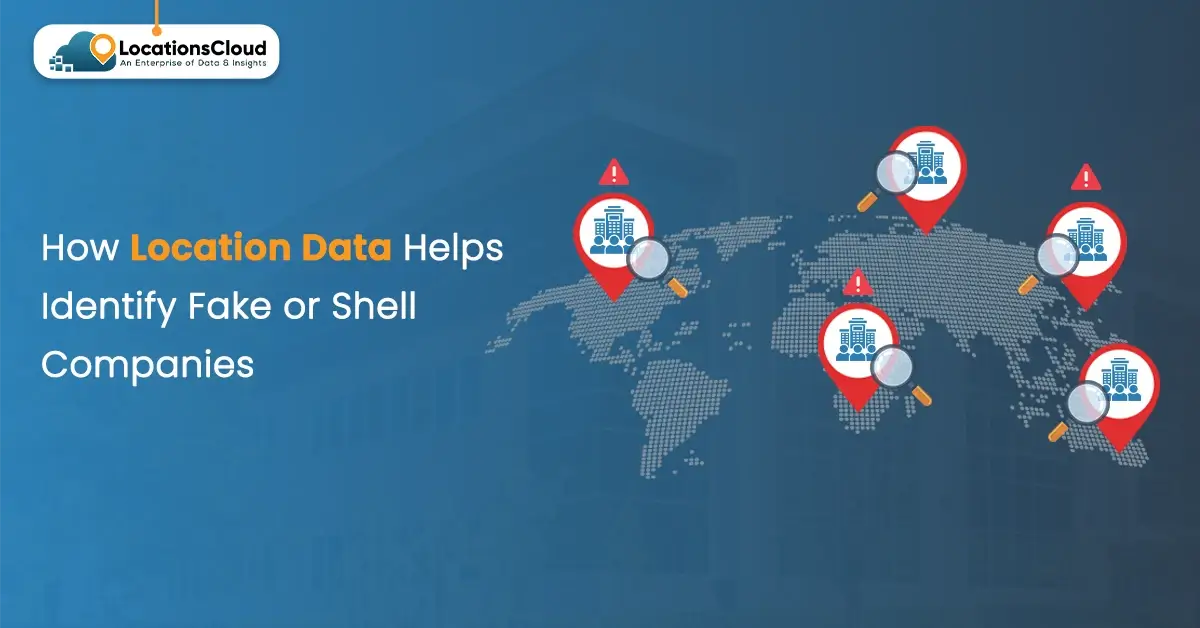
The borderless, cross-industry and cross-platform interaction amongst companies in the global digital economy is unprecedented. These partnerships are based on trust and transparency, although through loopholes in the system, criminals create shell companies and fake organizations. These are organizations that are usually on paper, and they do not have any actual business operation, employees, and infrastructure. They are employed to clean up dirty money, evade taxes or conceal ownership. The problem facing both regulators and businesses is the best way to detect and wipe out such organizations within their networks.
Know Your Business (KYB) regulations are intended to address this problem and the current, data-driven tools contribute to the improvement of their effectiveness. Of these tools, location information has turned out to be an effective weapon of catching inconsistencies, proving business presence, and shedding light on shell operations. With the implementation of location intelligence within the KYB processes, an organization can guarantee compliance, ward off financial crime, and foster greater trust with stakeholders.
What is Shell Company and the risks associated with it?
Shell companies do not always constitute illegalities. They also legitimately have a role in others such as intellectual property ownership or company restructuring. However, their business lacks transparency and hence criminals would have interests in them. The illegal players form shell companies in order to cover the ownership or transfer money across the borders or launder the money in terms of trade.
In the case of banks, fintechs, and corporations, working with such companies presents them with extreme risks. The most common impact of not identifying fraudulent entities is regulatory penalties, damaged reputation, and the loss of customer confidence. In addition, organizations cannot risk poor KYB practices as international regulators step up the Anti-Money Laundering (AML) enforcement. There has never been a stronger need to have a strong verification.
KYB and its role in Business Verification
Know Your Business is a mandatory regulatory measure which extends beyond the conventional Know Your Customer (KYC) inspections. Whereas KYC checks the people that a customer is, KYB checks the business that an organization transacts with to ensure that it is a legitimate and legal business. This is done by a validation of the registration of the company, verification of the beneficial ownership structure and also verification that the business is not linked to an illicit business.
However, there are strong limitations with the usage of documents or self-reported data only. The paperwork and even false records can be easily manipulated by fraudulent businesses, or gaps in the outdated databases can be used to exploit them. This is the reason why incorporating high-tech authentication systems such as location information is becoming invaluable in enhancing KYB compliance.
The significance of Location Data in KYB Compliance
Location data also creates a new layer of verification to the business as it addresses the physical location of the organization. A legitimate firm should have a traceable presence, be it an office, retailing space or a factory. Conversely, shell companies have a habit of providing fake addresses, deserted properties, or virtual offices as a way of appearing to be legitimate.
Using the cross-referencing of the addresses given with the geospatial datasets and the Points of Interest (POI) databases, compliance teams can easily determine the authenticity of a business. In case the addresses mentioned in the list result in a vacant field, a home, or a place that does not fit the operations of the company, it is a possible red flag. This renders location intelligence an essential measure when it comes to exposing shell structures which could pass unnoticed in the course of traditional checks.
Identifying Shell Companies by Geospatial Insights
Geospatial intelligence is much more than a yes or no answer to such a query as an address. It provides background on the character and validity of the location of the business. To illustrate, when a company boasts of being a large exporter yet the registered address is in the small residential area, it immediately arouses suspicion. On the same note, in case businesses are sharing an office with other businesses in a high-risk jurisdiction, compliance officers may conduct additional investigation.
With modern technology it is possible to combine satellite images, property records, business databases to create an entire image. These will help organizations shift towards proactive prevention rather than reactive detection and prevent fraudulent entities that may find a loophole to exploit the financial system.
Response to Address Verification as AML Compliance
Address verification is one of the foundations of AML frameworks as pointed out by regulators across the globe including the Financial Action Task Force (FATF) and other regional authorities. Conventional checks of addresses are often based on such documents as utility bills or registration certificates that are simple to forge or to manipulate. Location data comes out of these shortcomings by authenticating addresses in real-time using trusted datasets.
Not only does this method help to minimize the false positives, but also it creates powerful audit trails in the hands of compliance teams. In case regulators raise concerns about the reasons why a business was onboarded, organizations are able to prove that they conducted advanced verification, such as geospatial checks. Such hard work builds confidence and safeguards against possible fines.
The Advantages of Location Intelligence to Businesses
The use of location intelligence within KYB operations provides various business benefits. It simplifies the processes of onboarding since it saves time and resources by eliminating manual checks. It enhances accuracy as it detects inconsistencies that would not have been noticed otherwise. It also minimizes the chances of fraudulent partners being brought on board hence the organization is safeguarded against reputation damage.
Last but most important it builds long term trust by the regulators and the customers. In the era of transparency being a non-negotiable factor, showing that one is committed to high standards of compliance might make them competitive. Companies employing the high level of verification not only escape sanctions but also become responsible and worthy partners in the global economy.
KYB and Location-Based Verification Future
KYB has a chance to improve its future by integrating the KYB with new technologies and enhancing the current compliance strategies. Verification and anomaly detection on a large scale are already being automated with the use of artificial intelligence, machine learning, and big data analytics. The intelligence of location will be the focus of this revolution because it will give a real world picture that the documents never capture.
Governments are increasingly demanding increased corporate disclosure, and shell companies are becoming more sophisticated, which will require more powerful tools to keep an organization afloat. Live location verification will cease being an additional feature to consider, but rather a requirement. The organizations that implement them early will be in a better position to deal with risks and be flexible to the emerging global standards.
Conclusion
Shell companies and fraud organisations are a major challenge to the financial system integrity. Although conventional verification procedures are still relevant, they can no longer be used to identify advanced fraud. Location data has become a vital element of new KYB and AML compliance that helps companies to secure the existence of businesses, expose inconsistencies, and avoid financial crime.
Through geospatial intelligence, the businesses will go beyond the surface checks to discover the background risks of fake or shell companies. With the increasing regulatory attention, combining location information with KYB operations is not only a necessary response to compliance demands but a long-term investment in trust, security, and success.


